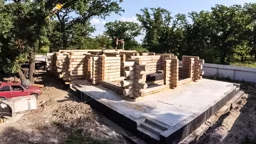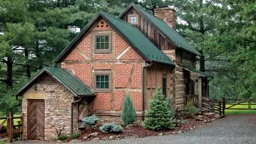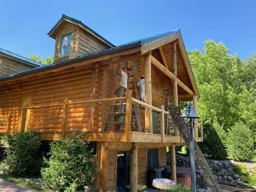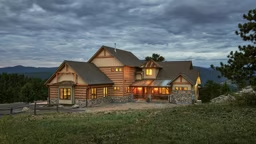
If there’s one thing my 30 years as a log home builder has taught me it’s that the average log home buyer doesn’t always understand his or her role in the construction process. Nor do they fully understand the builder’s role.
To help, I’ve devised an analogy that’s easy for most people to understand: sports. You, the log home buyer, are the team owner. You select the players that will perform the best within your salary cap, aka, your budget.
At the end of the day, it’s your money that’s funding this endeavor, and it’s you who will live with the results. Choose wisely. As the team owner, you’re responsible for hiring the head coach — that’s the builder.
His role is to execute your vision, manage the players (subcontractors) in the field and provide feedback on how those players are performing, as well as progress as it’s made.
Yes, your coach/builder reports to you, but for him to be truly effective and build your dream log home, there are a few things you can do to help your builder help you. And it starts with complete honesty and transparency in the following areas:
Budget
Establish a solid budget, and convey the true number to your builder. To use our analogy, if a coach doesn’t know what each player’s worth is, he can’t manage the members of the team or give direction. A reputable builder is not out to spend all your money; he does, however, need a detailed breakdown of how much of your budget you want to allocate for each area of the home.
Expectations
Construction is not a perfect process, and in the field, there will be road bumps that impact progress. If you expect that everything will go flawlessly, you are setting up your builder for failure and yourself for frustration. A dose of realism will go a long way toward making the finished home everything you want it to be.
Vision
Builders are not mind readers. Their job is to listen to you and take care of the tasks at hand. It’s vital you have a clear vision of the finished product and convey it to your builder. The more clearly you express your vision, the better he’ll perform. Provide photos or illustrated examples. If there are certain finishing materials you prefer, supply him with product and serial numbers. If you put the builder in the position of having to guess what you want, there’s bound to be miscommunication. But remember, part of his job is to manage your vision against your budget, so if he offers frugal alternatives, consider them. This goes back to having realistic expectations.
Input
A builder worth his salt wants your input, so make yourself available. Visit the site, ask questions and work with him to manage the schedule. When your builder asks you to make a decision, don’t procrastinate. He will work at your pace, so if you want to keep the process moving along, be responsive.
Communication
If you’re building this home with a spouse or significant other, you’ve got to be on the same page before talking with your builder. Builders aren’t marriage counselors, so if you can’t find common ground with your spouse on some aspects, don’t put him in a position to choose sides. It won’t be good for your project or your relationship. Assign one and only one of you to be the point of contact with your builder.
Respect
Your builder wants to do a great job for you. It’s easy to point out problem areas or come down on him if your schedule veers off course; but don’t forget to praise him if he completes a phase early, solves a tough problem onsite or finds unexpected cost savings. A periodic morale booster when things go right will encourage him and his team to do an even better job for you.
Trust
For all the involvement you should have in the construction of your log home, don’t be an owner that tries to coach from the sidelines. When it comes to the team of subcontractors, let your builder do the job you hired him to do. If you don’t, you may introduce mistakes that could cost you thousands of dollars to fix. You’ve entrusted what is likely the most complex and expensive project of your life in your builder’s hands. Let him call the plays.
Dan Mitchell owns Eagle CDI in Tennessee and has built close to 100 log homes in his 30-year career.











